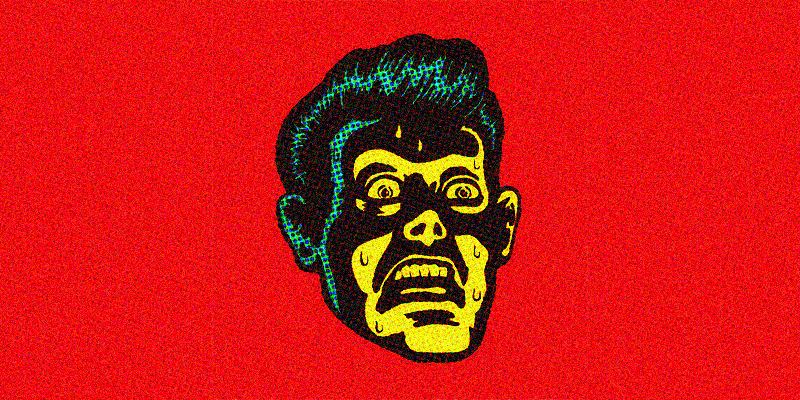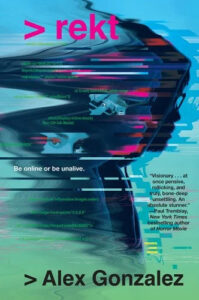When writing violence, when does the violence become too much? When reading violence, when does the reader stop caring? If your answer is when it doesn’t serve the plot, then you can kindly hit the bricks. If your answer is that it happens to the “wrong” character, I urge you to fall into a manhole. If your answer is that it’s “needlessly cruel” then my question back is compared to what?
My book rekt was called “edgelord” and I’m not entirely sure what that means. Instinctively, I became frightened at the accusations that I was uneducated or unskilled or some incel troll type, but then I realized that that specific self-reflection was the problem. It’s no secret that these days, with the rise of BookTok, BookTube, and #tropes, labels and categories are everything. While I’m sure this is linked with SEOs and shelf talkers and building audiences, what it has mostly done is make an automated labeling system. Off the top of my head, in the genres I work with, I know this much: “elevated horror” suggests “literary” and, thus, award friendly; “transgressive” means taboo and boundary pushing but not without “merit”; and “edgelord” means vile garbage. Going deeper, “splatterpunk” might suggest the amount of blood and bones in a work, and the word “punk” might suggest someone progressive, young, and community minded. But the term “edgelord” suggests that the blood and bones are coming in bad faith.
Again, I ask you: compared to what? Is there a series of parameters one must achieve before they earn their violence? How many chapters of poetic backstory does there have to be before someone’s shot in the head? How dimensional must a character be before a brick cracks their skull in? What workshops and MFAs do I need to have attended before writing a massacre? And, perhaps more to the point, how many words do you devote to the scene? What’s the perfect amount?
To call someone an edgelord is to excise them. It suggests that the subject matter they have brought to the story is not worth engaging with. They didn’t reach the literary qualifications to justify a hate crime scene. Or, specifically in my scenario, my 100 or so snuff film descriptions didn’t pass some arbitrary test.
But, believe it or not, I’m not mad.
It seems to me that, as of late, we’re all hoarding our empathy and looking for any reason to not let a book rattle us. If I have 10 Empathy Tokens, I cannot waste one on a story whose author’s intent is to shock and provoke. An ‘edgelord’ label suggests that there is no heft to the writing. There is “no point.” The gore and guts “don’t serve a purpose.” It’s just provocative and shocking and this and that. Why would I waste my empathy tokens if the violence doesn’t have a point?
About a year or so ago my cousin was hate-crimed on the train and now carries a taser. I’m not certain what the point was then, but I spent a token.
rekt takes place at my alma mater Florida State University where, as of typing this, a school shooting just occurred. What was the point? I spent a token. Not to mention I was there in 2014 when another shooting occurred. I spent tokens then too.
So, maybe right there is a good argument, and I mostly agree. The world is already so pointlessly violent and upsetting and we’re already giving out Empathy Tokens faster than we can generate them. When we sit down to write, maybe there’s something noble in trying to make sense of it. In adding reason to the violence, making it easier to digest and understand and grapple with.
But is that honest?
There’s a good stretch in rekt where our main guy terrorizes young women, gets them drunk, and shows them AI videos of their own deaths. It could be true that the ‘point’ was showing his toxic masculinity and downward spiral, showing how his choices affect others. Could I have done that in a paragraph? Maybe. But did I want to drag the reader through the mud? Yeah, I did. Because otherwise they wouldn’t have felt it. And maybe feeling it is the point. Sometimes the shock to the system gives it heft. In a horrible horseshoe paradox, sometimes the mindlessness of the violence is the most honest part of all.
Everyone loves to quote the Stephen King hierarchy of scares: to terrify is the goal, to horrify is second best, and to gross-out is base and cheap. But King also said that Clive Barker was the future of the genre and Barker’s debut collection featured “Rawhead Rex” – a massive penis monster that ate babies, so the jury is out regarding the so-called scare-tiers. My point is that an edgelord is not an edgelord until they’re called one, and they’re usually labeled as such in a knee jerk reaction.
But let’s aside the question of violence for now and talk about the other undeniable connotation of the ‘edgelord.’
It’s that their politics are bad.
Look, I get it. These days, every day is an ideological (and sometimes literal) knife fight for basic human decency. When you sit down with a work, you don’t want to witness the sludgy crawl of a lunatic manifesto, and you definitely don’t want to spend an Empathy Token on them. But here’s the thing: where’s the trust? Genre is a safe space, but that should not be confused with safe content. In fact, I argue it’s the opposite. Because genre is a safe space, the writer should feel comfortable stepping out into troubled waters. This is not to say “a marketplace of ideas” or any of that other coded, dog-whistle language, but if we’re engaging with ‘violent subject matter’ then we should be brave enough to deal with it in all directions.
Are you afraid to write the stabbing scene? Or the racist slur scene? Are you afraid to indulge in the lurid POV of the local pervert? Are you afraid to accidentally give a convincing argument for the bad guy who chops up little kids? Or, even more worrisome, are you a POC and/or queer author who feels backed into a certain story? My brother in Christ, I trust you. I walked to the horror section, I read the synopsis, I paid hard cash. I do not come to your books to teach me morality. I come to you to be honest. I want the problematic plots, the questionable storylines, and the vaguely offensive concepts. Why? Because I feel safe in the genre. It’s 100% true that genre writing is political and progressive. But you should rest assured that the onus of learning is on me.
I’m an adult man. I’m educated, well adjusted, and know between right and wrong. I’m not coming to you to learn how to love my queer relatives or treat POCs with decency. I’m not coming to learn why capitalism is bad or why minorities deserve rights. I know all these things. If you want to give me a story that flies in the face of these things, that goes way over the line, I’ll happily grapple with these ideas. I believe in radical self-reflection. Exploration is not an endorsement. How can I know my values if you don’t challenge them? How can I know what I stand for if you don’t upset me?
Voices from all over should feel emboldened to explore the subject matter that they want. Only in this way, can the genre improve and readers can begin to cross pollinate.
I read Mónica Ojeda’s Nefando where young artists upload videos of their own child sex abuse to the internet for others to see. Was it shocking? 100%. Did I feel like Ojeda was robbing me of my tokens? No. It was nice to spend them, even if my reload time took a bit.
I read Roberto Bolaño’s 2666. Pages and pages and pages of rape and murder. Did I think he was trying to “get me.” Yeah, I do. Was it part of the experience and worth it? Totally. And yes, I ran out of tokens during that one but that was also the “point” of it.
I read Michael J. Seidlinger’s Anybody Home? Did that book intentionally keep me at arm’s length? Yes. And it was challenging to feel so helpless and it made me look inward to what I value when depicting violence. It felt good to see my own convictions take shape. Convictions that I had never asked myself about before.
It’s a bummer to think that if someone pitched those authors as “edgelord” I might not have picked them up. I might not have learned about myself. And, look, far be it from me to put my name up with those authors; they’re legends and heroes. And I’m not going to win, fighting the edgelord label. But maybe I can convince writers to just embrace it. Write extreme. Get lurid. Don’t back away.
And to readers, maybe I can convince you to stop hoarding your tokens. It’s nice to spend them. Think of it like you’re investing in the genre and yes, yourself.
***


















